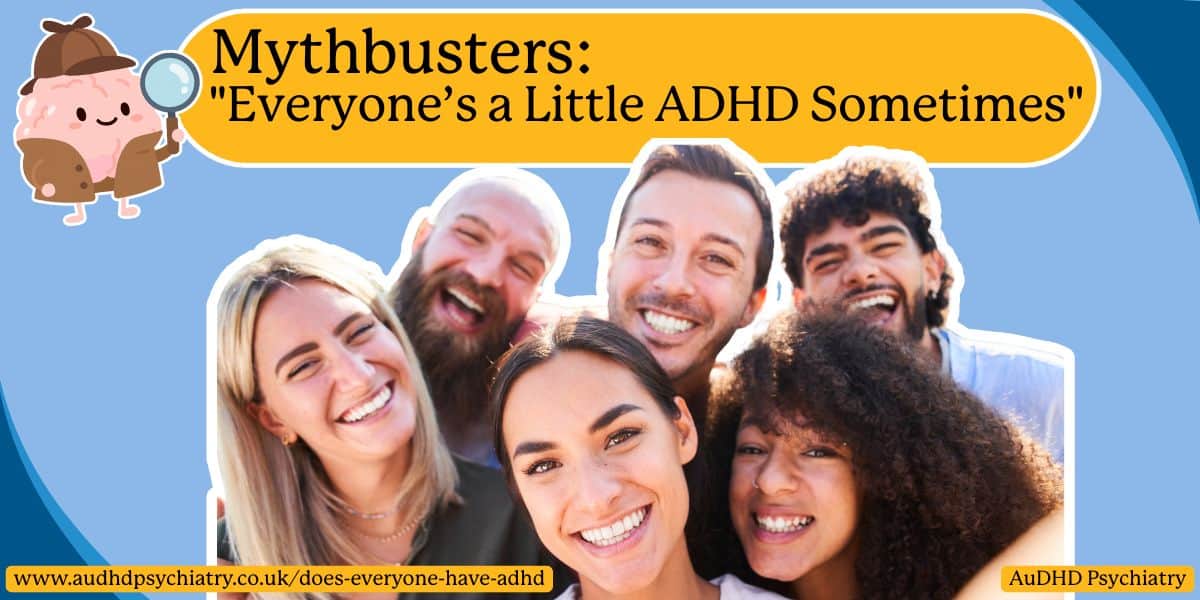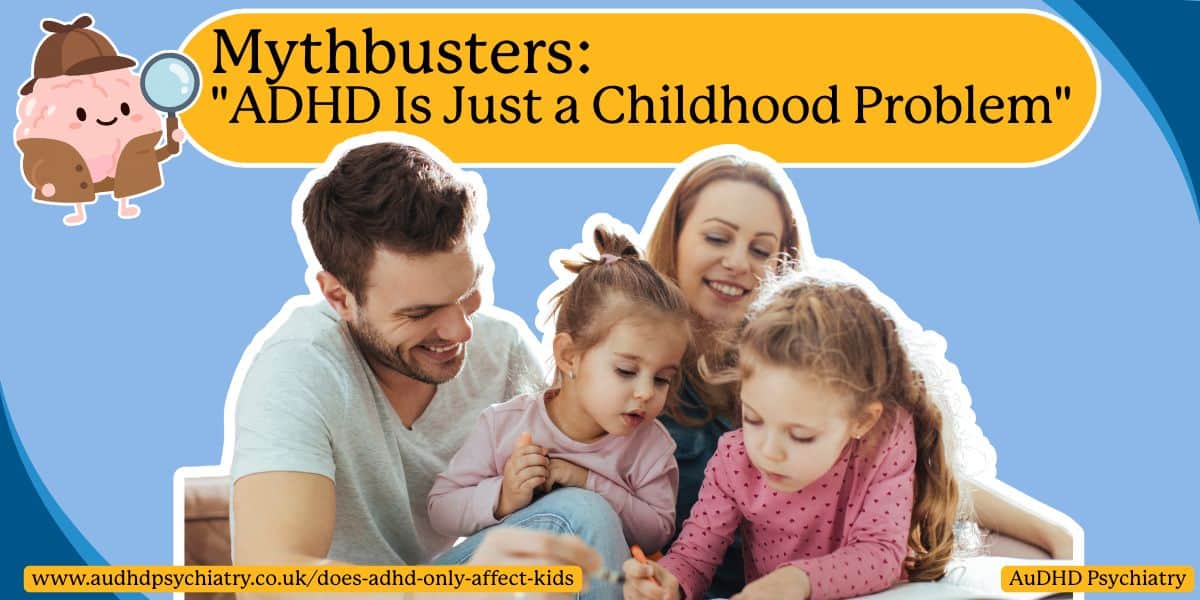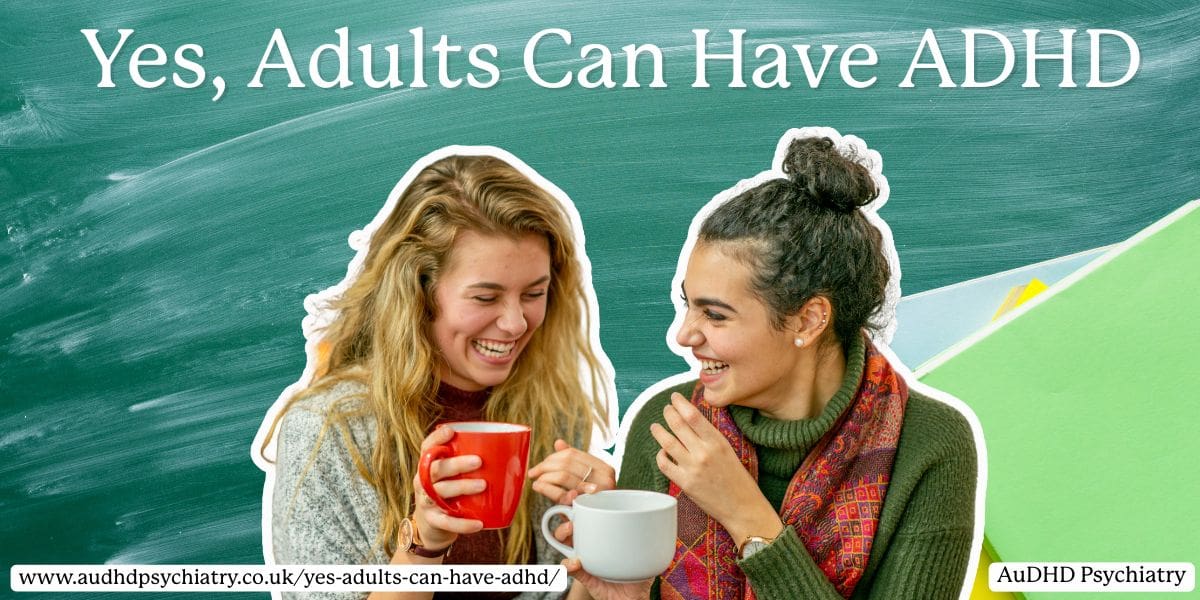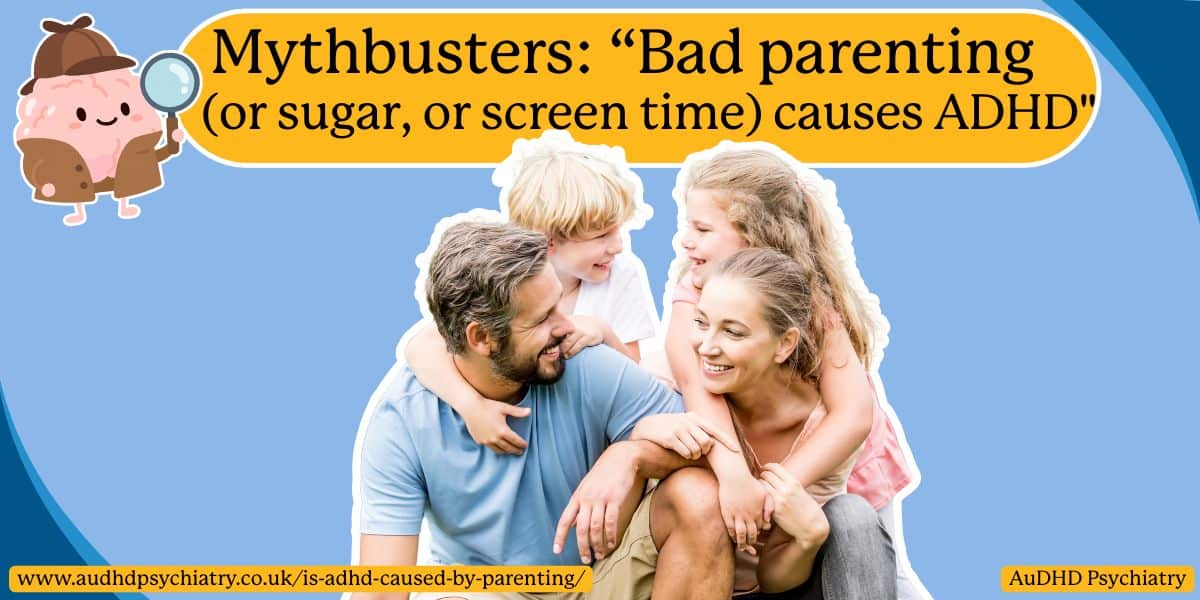
Is ADHD Caused By Bad Parenting?
Have you seen parents blamed when a child struggles with focus, restlessness, or impulsivity? For decades, people have suggested that ADHD is caused by bad parenting, dismissing the condition as a matter of discipline or home environment. This is one of the most destructive myths surrounding ADHD, and one that may cause harm to both children and parents.
The reality is that ADHD (attention deficit hyperactivity disorder) is a recognised neurodevelopmental disorder, supported by decades of clinical evidence and a mountain of science showing strong genetic and neurological roots. Parenting may influence outcomes, but it is not the cause of the problem.
In this article, we’ll separate myth from fact, explain the role of brain development and risk factors, and show why parents are not to blame. If you’re seeking clarity, an ADHD evaluation with AuDHD Psychiatry can provide the first step towards support and understanding.
Why Parents Get Blamed for ADHD
For decades, the behaviour of children with ADHD has been misunderstood. Symptoms such as inattention and hyperactivity were once dismissed as simple immaturity or the result of poor discipline. Teachers and neighbours were seen to judge the parents of children, assuming a lack of authority or inconsistent routines explained the difficulties. This narrative has fueled stigma and contributed to one of the most harmful misconceptions in the field: that bad parenting causes ADHD.
The Weight of Blame on Families
Parents often internalise these views. Parent self-blame is common, especially when schools or relatives suggest they are “not strict enough.” Parenting criticism may cause a sense of failure, which can feed into parent depression, stress, and conflict at home. For many families, ignorance of others leads to constant judgement and even exasperated disdain, making it harder to seek support.
Evidence also shows that parents of children with ADHD experience higher stress, family conflict, and reduced perception of social support compared with parents of neurotypical children [1]. This strain can sometimes push caregivers toward harsher or less consistent parenting practices, creating a cycle where stress amplifies behavioural challenges. Breaking this cycle requires shifting focus from blame to structured support.
Why the Myth Persists
Several factors explain why the myth of the “bad parent” endures:
- Lack of understanding about a child’s behaviours that are neurologically driven, not voluntary.
- Outdated views that attribute hyperactivity to poor discipline or laziness.
- Cultural expectations around obedience and achievement.
Shifting the Conversation
It is essential to move past these outdated beliefs. ADHD is not a result of parental failure but a recognised neurodevelopmental disorder. Raising ADHD awareness, not blame, is the key to ensuring families access proper assessment and support. For more on why ADHD is not an excuse or invention, see Is ADHD Real?.
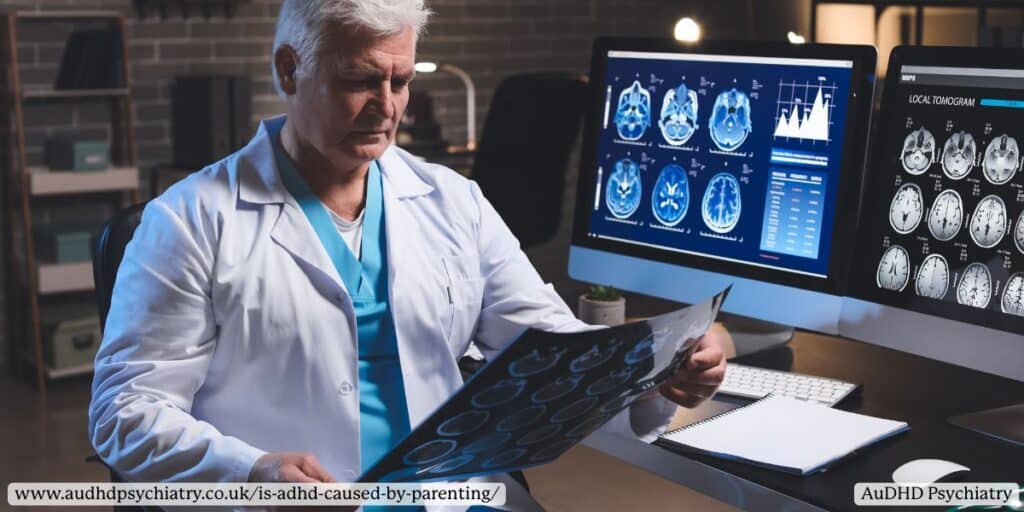
ADHD is a Neurodevelopmental Disorder — Not the Result of Parenting
Scientific research consistently shows that ADHD is a neurologic disorder, not the outcome of parenting. It is best understood as a brain-based disorder of behavioural inhibition, with decades of evidence supporting its classification as a hyperactivity disorder and a complex neurodevelopmental disorder.
Scientific Foundations
Tools such as functional MRI, radioisotope scans, and neuropsychological testing have revealed clear patterns in individuals with ADHD. These include differences in executive functions such as impulse control, planning, and focus. These findings are not anecdotal. They form part of a mountain of science that continues to expand.
Renowned experts have also contributed extensively to our understanding, showing how ADHD is tied to brain structure and function rather than environment alone.
Genetic Risk Factors
Evidence also highlights the strong heritability of ADHD. Studies of identical twins confirm that ADHD runs in families, with genetic risk factors playing a major role. This inheritance pattern rules out simplistic explanations such as poor parenting and underscores ADHD as a neurologic disorder.
Why This Matters
Parents deserve to know that their child’s difficulties are not their fault. Recognising ADHD as a brain-based, medically recognised condition allows families to focus on support and treatment rather than blame.
Parenting Styles and ADHD: What the Science Really Says
While parenting styles and ADHD outcomes are linked, parenting does not cause the disorder. Instead, approaches such as authoritative parenting, authoritarian parenting, and permissive parenting influence how well children cope with symptoms.
Authoritarian Style and ADHD
An authoritarian approach has strict rules, fewer emotional connections, and “tougher limits.” This can sometimes lead to increased behavioural problems. Children with ADHD may feel misunderstood or unsupported, compounding their difficulties.
Authoritative Style and ADHD
In contrast, authoritative parenting combines structure with empathy. Positive parenting practices such as consistent expectations, positive reinforcement, and an individualised approach help children develop coping skills and manage their child’s ADHD more effectively.
Permissive Parenting and ADHD
Permissive parenting, where rules are minimal and boundaries unclear, can result in lax parenting. This may contribute to aggressive behaviour or increased frustration for children already struggling with regulation.
The Bigger Picture
Research shows that a lack of positive parenting practices or negative parenting approach may worsen behavioural problems, but they do not create ADHD. The condition stems from neurological differences, not parental shortcomings. What parenting deficits can do is influence how a child manages challenges, develops resilience, and learns strategies for success.
Families benefit from resources and parenting skills training, which help create a stable family environment rather than focusing on misplaced blame.
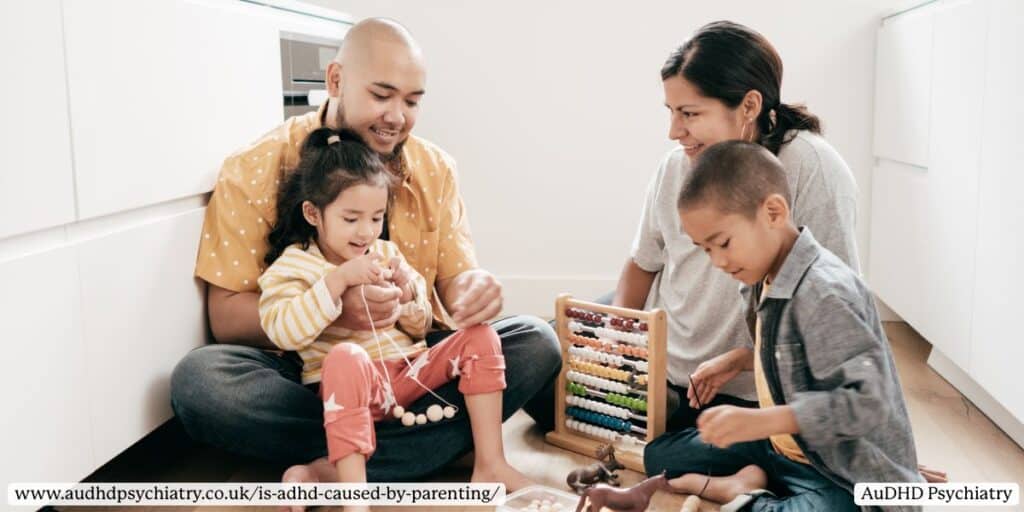
Environmental Risk Factors vs Parenting Skills
It is tempting to assume that difficult behaviour in children must reflect a parenting deficit. Yet research shows ADHD is linked far more strongly to environmental exposures, neurochemical imbalances, and genetics than to parenting alone. While parenting skills can affect how a child manages symptoms, they do not cause ADHD.
Research found that there is a significant relationship between the risk of ADHD symptoms and parenting style: authoritarian and permissive parenting were linked with more difficulties, while authoritative parenting was associated with better outcomes [2]. However, even in these cases, parenting style acted as a risk factor that influenced severity, not the underlying cause of ADHD. Genetics and neurochemical imbalances remain the primary drivers.
Established Risk Factors
A range of influences has been identified:
- Low birth weight and premature delivery, which increase vulnerability to attentional problems.
- Neurochemical imbalances involving dopamine and norepinephrine, impacting how the brain regulates focus and self-control.
- Stress conditions in early childhood, which may worsen symptoms but are not the underlying cause of the problem.
These risk factors reinforce that ADHD is not the product of poor discipline or lax
Traits of ADHD in Children and Adults
ADHD presents differently depending on age, but the symptoms of ADHD remain consistent: difficulties with focus, hyperactivity and impulsivity, and regulation. These are not fleeting quirks but patterns recognised in the ADHD diagnosis.
ADHD Symptoms in Children
In childhood ADHD, signs often include restlessness, constant movement, and classroom disruption. Hyperactivity disorder symptoms such as excessive talking or running around are common. Children may also show inattention symptoms like forgetfulness, careless mistakes, and poor organisation. Without recognition, these behavioral problems may be labelled as laziness or poor discipline.
ADHD in Adults
Adult ADHD often looks different. Hyperactivity may evolve into internal restlessness, difficulty relaxing, or racing thoughts. Problems with executive functions, such as planning and active working memory, become more pronounced. Many adults also face challenges with emotion regulation and maintaining stable relationships.
Key adult symptoms include:
- Losing focus and trouble concentrating on long tasks.
- Forgetting commitments, leading to low self-esteem.
- Struggling with deadlines, causing workplace stress.
Why Understanding Matters
Recognising these characteristic deficits is crucial. The nature of self-control in ADHD reflects structural brain differences, not weak willpower.
Do Kids Grow Out of ADHD?
One of the most persistent myths is that children eventually outgrow ADHD. While some childhood ADHD symptoms may lessen, many continue into adulthood. Research shows a clear continuation of the condition, with adult ADHD affecting daily functioning well beyond school years.
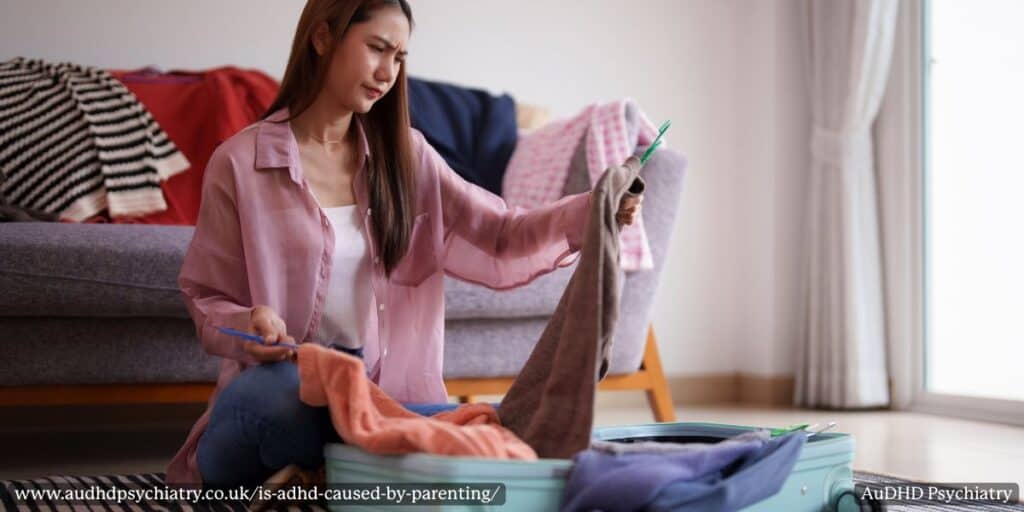
Developmental Trajectory
Hyperactivity has been seen to decrease with age, but inattention symptoms and impulsivity usually persist. Adults describe losing track of time, difficulties with organisation, and ongoing restlessness.
Evidence from Studies
Studies on ADHD traits from childhood into adulthood found that while symptom expression changes, the underlying condition remains. This aligns with clinical experience: individuals adapt, but ADHD rarely disappears entirely.
Why Recognition Matters
Assuming a child will “grow out of it” risks delaying support. Without diagnosis and treatment, many face a hard time transitioning into university or work. Early recognition improves outcomes by addressing challenges before they escalate. Parents have a major role in supporting children through this learning process.
The Risks of Believing ADHD Is Only for Kids
The myth that ADHD is purely a childhood issue has lasting consequences. Adults who internalise this belief often dismiss their own symptoms, leading to untreated ADHD mental health complications.
Risks of Ignoring Adult ADHD
When symptoms go unrecognised, the results can be severe:
- Higher rates of substance abuse as individuals self-medicate.
- Greater vulnerability to anxiety disorders and depression.
- Struggles with daily lifetime management, including work deadlines, bills, and parenting responsibilities.
- Reduced ability to see their own positive behaviours and achievements, leading to declining confidence.
Why Early Intervention Matters
The first step toward improvement is recognising ADHD as a lifespan condition. Parent training helps families support children early, while adults benefit from accurate assessment and tailored interventions. For many, stimulant medication prescribed by healthcare providers significantly reduces inattention and impulsivity, helping restore stability.
The Cost of Delay
Without treatment, adults may cycle through jobs, face broken relationships, or experience burnout. Believing ADHD is “just for kids” keeps too many people from accessing support. Recognising the risks is essential for building resilience and reducing stigma.
How ADHD Is Diagnosed in Adults
An accurate ADHD diagnosis is vital for children and adults alike. In adulthood, assessments focus on history, behaviour patterns, and ruling out other conditions such as psychiatric disorders and mood disorders.
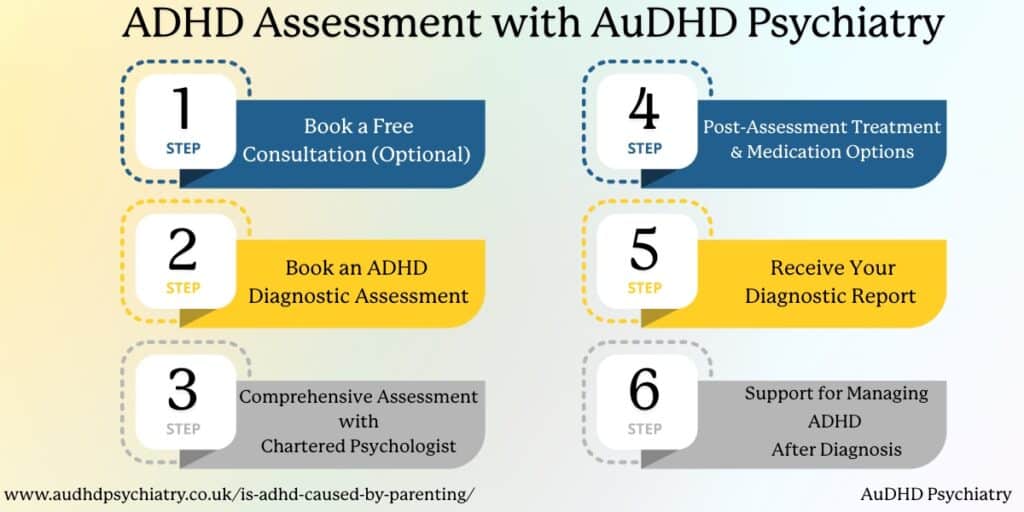
The 6-Step ADHD Evaluation Process with AuDHD Psychiatry
Step 1. Free Consultation (Optional)
Begin with an optional consultation to discuss your concerns, ask questions, and decide if an ADHD evaluation is the right next step.
Step 2. Book a Diagnostic Assessment
Schedule a formal ADHD assessment with one of our specialists. This ensures you receive structured, professional support tailored to your needs.
Step 3. Clinical History Review
Your clinician will explore childhood symptoms, family history, and current challenges. This helps identify patterns across your lifespan.
Step 4. Symptom Checklists & Testing
We use validated checklists and neuropsychological testing to measure attention, executive functions, memory, and behavioural regulation.
Step 5. Screening for Co-Existing Conditions
Because ADHD often overlaps with anxiety, depression, or other psychiatric disorders, screening for these is an essential part of ensuring accuracy.
Step 6. Comprehensive Diagnostic Report & Next Steps
You’ll receive a detailed diagnostic report and a personalised treatment plan, including options such as medication, therapy, and coaching.
The Role of Specialists
A developmental-behavioural paediatrician, psychiatrist, adult ADHD specialist, or other appropriately qualified healthcare professional is instrumental in confirming the diagnosis. They ensure accuracy, preventing false positives that could arise from misinterpreting stress, trauma, or sleep problems.
Why Early Intervention Matters
The sooner adults receive clarity, the sooner they can access effective treatment and reduce associated mental health issues. For those weighing options, our NHS vs Private ADHD Assessment guide might help determine which route you should choose.
Effective Treatment and Management for Adults
Receiving an ADHD diagnosis is only the beginning. For adults, the path forward involves a combination of medical, behavioural, and lifestyle strategies designed to improve focus, regulate emotions, and strengthen executive functions.
Medication Options
The most common medical approach involves stimulant medication, which has been shown to significantly reduce core ADHD symptoms. By balancing brain chemicals such as dopamine and norepinephrine, these medications improve attention and impulse control. For those unable to tolerate stimulants, non-stimulant alternatives are available.
When prescribed carefully by experienced healthcare providers, these medications support better behaviour and daily functioning.
Therapy and Coaching
Medication alone is rarely enough. Adults often benefit from therapy that focuses on building structure, emotional regulation, and time management strategies. Coaching can reinforce these skills, helping patients apply them in daily life.
Lifestyle Adjustments
Simple but consistent changes make a big difference:
- Prioritising quality sleep to address sleep problems.
- Creating structured routines and using reminders.
- Seeking workplace accommodations, such as flexible schedules or task management tools.
These combined approaches reflect the best treatment model—one that is individualised and comprehensive.
Taking the Next Step
Recognising symptoms is the first step. Too often, adults delay seeking help due to stigma or misconceptions that ADHD is only for children. But with the right support, progress begins quickly.
At AuDHD Psychiatry, we provide private ADHD evaluation services tailored for adults and children. Patients start with a detailed assessment that considers history, symptom presentation, and co-existing conditions. From there, we design a personalised treatment plan that may include stimulant medication, therapy, or coaching.
For those hesitant, even small steps can make an impact. Completing an online ADHD test provides a useful screening tool and helps clarify whether further assessment is needed.
Getting clarity allows individuals to move forward with treatment, reduce mental health issues, and improve functioning at work, in relationships, and in their studies. Early intervention leads to better lives and prevents years of unnecessary struggle.
Is ADHD Caused By Bad Parenting: Conclusion
The belief that ADHD is just a childhood problem is a harmful misconception. In reality, ADHD is a neurodevelopmental disorder that can persist into adulthood, shaped by genetics, brain development, and environmental factors. Adults with ADHD face challenges with focus, organisation, and emotional regulation, but with the right interventions, they can thrive.
We’ve seen how myths of bad parenting, assumptions of immaturity, and ignorance of adult ADHD contribute to stigma. Yet a mountain of science, including decades of research studies and neuropsychological testing, proves ADHD is a legitimate condition requiring structured care. Parents and families are not the cause of ADHD, but they are an essential part of the solution. With support systems, structured routines, and professional guidance, children and adults alike can achieve stability and success.
If you’re wondering whether ADHD may be affecting you or your family, the last frontier is action. Book an ADHD assessment with AuDHD Psychiatry today—the first step toward clarity, effective treatment, and a better future.
References
- Setyanisa, A. R., Setiawati, Y., Irwanto, I., Fithriyah, I., & Prabowo, S. A. (2022). Relationship between Parenting Style and Risk of Attention Deficit Hyperactivity Disorder in Elementary School Children. Malaysian Journal of Medical Sciences, 29(4), 152–159. https://doi.org/10.21315/mjms2022.29.4.14
- Teixeira, M. C. T. V., De Freitas Marino, R. L., & Carreiro, L. R. R. (2015b). Associations between Inadequate Parenting Practices and Behavioral Problems in Children and Adolescents with Attention Deficit Hyperactivity Disorder. The Scientific World JOURNAL, 2015(1). https://doi.org/10.1155/2015/683062
You Might Also Like
Contact Us
We’re here to help. Reach out and we’ll get back to you as soon as possible.
Contact Us
We’re here to help. Reach out and we’ll get back to you as soon as possible.

